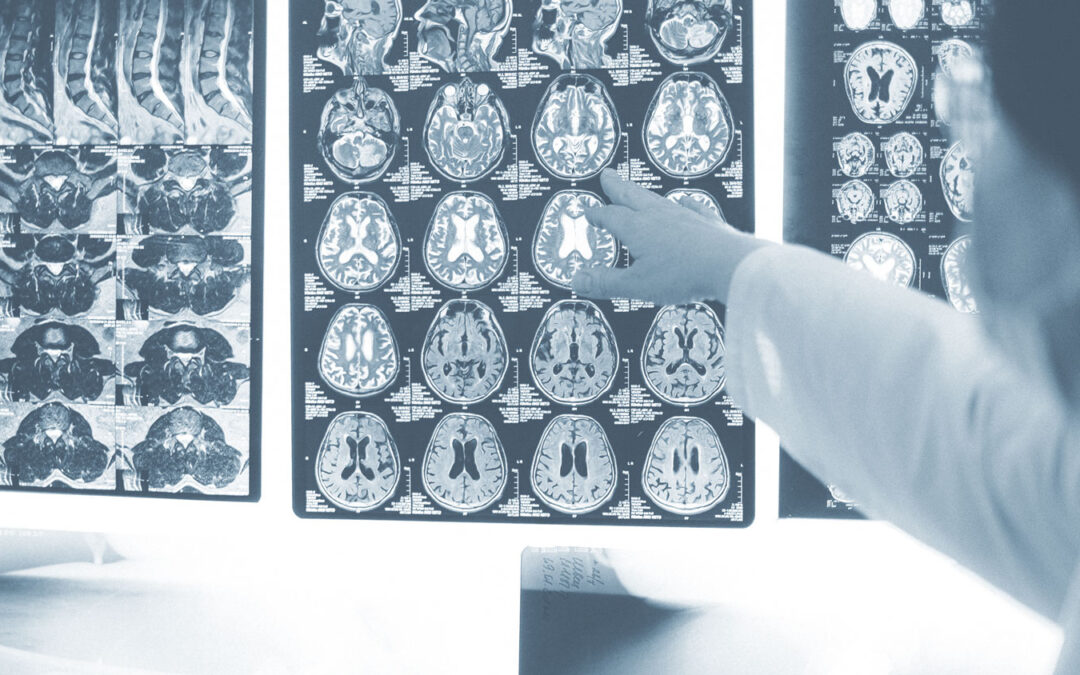Effects of Alcohol on the Brain
After years of study, alcohol is known to have a number of deleterious effects on the brain. This is important considering that 52.2% of Americans ages 12 and up report that they drink. More so, 6.3% (16.5 million) of these people are heavy users. Given the potential for the long-term effects of chronic abuse, these are devastating statistics.
However, the numbers do not tell the whole story, as occasional and moderate drinkers are also at risk of increased use over time and alcohol exacerbates existing mental health conditions. It is important to recognize the serious consequences that even moderate drinking has on an individual and to get help with recovery when drinking impairs your life.

How Consumption Affects the Brain
The amount of alcohol you consume has a lot to do with the way it affects your brain functions. These seven stages of consumption show the impacts of use:
- Euphoric: The increase in dopamine causes pleasant feelings. People function fairly well with slight memory and reason issues.
- Depressed: The blood-alcohol content rises and is absorbed into body tissues. You begin to forget things and feel disoriented and depressed.
- Excited: The lobes of the brain function differently and there are deficits in hearing, speaking and seeing. This is the stage of legal intoxication at 0.09 to 0.25 BAC. You react slower and lose motor skills.
- Confused: The ability to walk without assistance is difficult as coordination decreases. Blackouts are likely as memory functions are diminished.
- Shut down: This is when you go into stupor from an extremely high BAC. All system functions are weakened, and the risk of asphyxiation is high.
- Unconscious: The circulatory and respiratory systems are compromised, and a person is unresponsive.
- Dead: A BAC of over 0.45 may result in death as the brain loses control of all systems. This is usually a result of alcohol poisoning.
The brain endures the brunt of substance abuse as it loses the ability to communicate vital information with the rest of the body to regulate necessary functions.
How Alcohol Works on the Brain
Alcohol affects every person in a different way. Since everyone has a unique body chemistry, toleration varies person-to-person. However, the perception that some people can hold their liquor better than others does not bear out with time. Sustained alcohol abuse causes bodily changes and deterioration for chronic abusers.
Brain Chemistry
The effects of alcohol on the brain are well understood. Brain chemistry changes and then distorts how neurotransmitters work. This means that message signaling throughout the body no longer operates as it should. With this dysfunction, behaviors, thoughts and emotions are impaired. Regions of the brain experience different deficits from altered chemical responses.
Brain Regions
These areas of the brain fail to modulate correctly when alcohol is introduced even in small quantities:
- Cerebral Cortex: This is the region responsible for information processing.
- Cerebellum: This is the center for balance and movement.
- Hypothalamus and pituitary: These areas coordinate the release of hormones and the control of automatic brain functions.
- Medulla: This part of the brain controls the life-sustaining automatic functions: consciousness, breathing and body temperature.
Interference with regions of the brain occurs in one area or more during drinking episodes, depending on how much is consumed and how high the BAC rises.
Brain Cognition
How the brain processes information on alcohol is determined by the amount absorbed into the drinker’s system:
- Binge drinkers: People who occasionally tie one on think their splurges are generally harmless. However, many binge drinkers consume a large amount of alcohol in a small window of time, and this behavior leads to serious consequences due to dangerous BAC levels.
- Occasional drinkers: Individuals who drink on occasion do experience memory and behavioral problems. They tend to engage in reckless activities and put themselves and others at risk of physical harm.
- Moderate drinkers: Persons who use moderately are at risk of long-term cognitive conditions. They are likely to have accidents, falls and incidents of violence more often than light drinkers.
- Chronic drinkers: Someone who heavily abuses alcohol may still have cognitive declines even if they get sober. The brain is adversely affected in intellectual functioning and brain size is diminished.
Brain health is improved by abstaining from use. While people in detox show signs of cognitive gains, healing over months to years is the most beneficial.
How Alcohol Damages the Brain
Alcohol abuse is the cause of permanent brain damage. It is detrimental to people who have used for a significant period of time, and to those who suffer from other brain-related conditions.
Mental Health
Persons who have both an addiction problem and a mental health issue need help to ascertain the best course of treatment. A dual diagnosis means the underlying reason for addiction is difficult to separate from other clinical issues. Without finding the root cause of addiction, the chances of relapse or continued abuse are high.
To further complicate the issue, dual diagnosis is misunderstood within the broader healthcare system. People do not receive the encompassing care they need when only part of their health condition is recognized by medical providers.
Memory Impairment
Memory Cognition Impairment is a possible side effect of substance abuse. Research finds that 80% of chronic alcohol users are low in vitamin B1 (thiamine), which is a precursor for memory loss. MCI is debilitating, and people often lose their capability to be independent. With continued abuse, the effects become more severe and lead to dementia.
Korsakoff Syndrome
Some individuals severely deficient in thiamine for an extended time will develop Wernicke-Korsakoff Syndrome. These two diagnoses are typically paired together as Wernicke encephalopathy commonly precedes Korsakoff Syndrome. WE is lethal if not treated. People afflicted show lack of coordination, unusual eye movement and confusion.
Korsakoff syndrome usually follows due to the chronic memory loss associated with an attack of WE. Most cases of WKS are caused by alcoholism. This syndrome presents with disparate symptoms, as individuals may have remarkable losses in memory and few issues with social skills and thought processes.
Scientists have not determined why some alcoholics have thiamine problems while others do not, but the effects on the brain and quality of life are destructive and permanent.
How Females Are Affected by Alcohol
According to a study cited by the National Institute on Alcohol Abuse and Alcoholism, females are at greater risk of medical problems related to alcohol abuse. They develop liver, heart and nerve issues more rapidly than males. While disease manifestations were the same in men and women, the females in the study group used only half the time men did before showing symptoms of brain disease.
The study concluded that women were physically more vulnerable to alcohol-related illness and disease than men. Similar studies were inconclusive, but researchers feel some of the discrepancy comes from the fact that fewer in-depth studies are conducted on women.
How Rapid Alcohol Withdrawal Affects People
Users frequently believe the best way to deal with their substance abuse problem is to quit immediately. The physical and psychological consequences are often too much for a person to handle on their own. Rapid withdrawal depletes the body of important vitamins and electrolytes that jeopardize physical wellness.
People who come off substances quickly could plunge into depression and be prone to self-harm or suicide. A recovery program provides the medical and emotional support needed to get clean. The chance of long-range success as a sober person is better with care given in a treatment program.
How Recovery Changes Your Outlook
People who abuse alcohol and feel hopeless about addiction get the help they need through treatment. It takes consistent physical, emotional and spiritual support to recover and find your way forward in life.
Clean Recovery utilizes a unique whole-person treatment program that focuses on the strengths of each individual and supports you every step of the way. Our program provides the tools that put you on a clean, sober and productive path. Get in touch today for the help you deserve.
SOURCES:
- https://www.nm.org/healthbeat/healthy-tips/alcohol-and-the-brain
- https://www.nia.nih.gov/health/what-mild-cognitive-impairment
- https://www.alz.org/alzheimers-dementia/what-is-dementia/types-of-dementia/korsakoff-syndrome
- https://pubs.niaaa.nih.gov/publications/aa63/aa63.htm
- https://www.cleanrecoverycenters.com/dangers-of-quitting-drugs-cold-turkey/


